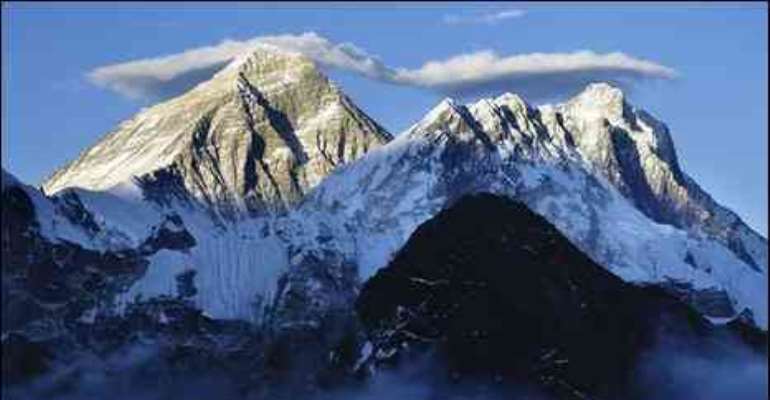EVEREST ‘DEATH ZONE’ TO BE CLEANED UP

A team of 20 Nepalese Sherpas is planning to clean up rubbish and bring the bodies of dead climbers down from the top of Mount Everest.
The Sherpas will work above 8,000m (26,240ft) – in what's known as the “Death Zone” because of the thin air and treacherous conditions.
They expect to bring back the bodies of at least two climbers, including American Scott Fischer, who died in 1996, and Swiss mountaineer Gianni Goltz, who died in 2008.
The expedition will set off from the Nepalese capital, Kathmandu, this weekend and reach the Everest's South Col, just below 8,000m, by 1 May.
After setting up camp on the South Col, the team will climb to the summit of Everest and start working their way down, picking up rubbish as they go.
Seven-times Everest climber Namgyal Sherpa is running the expedition.
He says this is the first time anyone has cleaned up rubbish at this altitude, but that it is important to do so to preserve the environment and make the mountain safe.
“I'm a climber and I can say frankly that I'm a little bit angry when I climb Mount Everest because of the rubbish,” he says.
Avalanches
Because of the lack of oxygen, freezing temperatures and punishing conditions, the Sherpas say they will not be able to carry more than 20kg per person and that they will spend no longer than 12 hours above 8,000m in one go.
They will stay on the South Col for a week, making several trips into the death zone, before returning to base camp, resting, and then repeating the operation twice more.
Namgyal Sherpa says the task will be dangerous, but that his team is experienced enough to cope.
Expedition leader Namgyal Sherpa says Everest should not be polluted
“We need to focus on avalanches and the different crevices. If you have the technique and if you have proper experience, it's not so dangerous,” he says.
The team expects to remove 3,000kg of old tents, ropes, oxygen cylinders, food packaging and camping stoves from the mountain.
They will also bring back the bodies of climbers who have perished while attempting to climb Everest.
“I have seen three dead bodies laying on the trail. But we know that there is another dead body also which we heard about a long time ago,” says Namgyal.
The team plans to bring down the body of Swiss climber Gianni Goltz to base camp, where they have been given permission by Goltz's family to cremate it.
“We have a special stretcher to bring the bodies down. We can put the dead body on a stretcher and then drag it slowly to base camp,” says Namgyal.
'Holy mountain'
They expect to bring down the body of American mountain guide and climber Scott Fischer.
Fischer died on Everest in 1996 – the mountain's worst-ever climbing season.
Fifteen climbers died that year, eight of them in one day.
Journalist Jon Krakauer later published the story of the tragedy in the book Into Thin Air.
The team says they may find the body of well-known climber Rob Hall
The team also suspect they will find the body of New Zealand climber Rob Hall, who also died in 1996.
Namgyal says some families have expressed the desire to leave the bodies on Mount Everest, as they feel this is what the climbers would have wanted.
However, the expedition project co-ordinator, Chakra Karki, says that Nepalese people do not want the mountain to become a graveyard.
“We respect the sentiments of the family of anyone who has died on Everest,” he said.
“But it is a holy mountain and our government policy is clear – there should be no dead bodies on the mountain.
“All dead bodies should be brought below base camp and either buried or cremated. They shouldn't pollute the mountain glaciers.”
New standard
As well as bringing down bodies, the team will concentrate on removing old ropes from expeditions as long ago as 1953.
These are still attached to the mountain and cause confusion for climbers who do not know whether they are secure or not.
“Those ropes are all the same and look brand new, but people misunderstand which ropes are new and which are the old ropes,” says Namgyal.
“If they attached themselves to an old rope, they'll have an accident.”
Namgyal says he hopes this expedition will set the standard for future clean-up operations.
“Whoever is climbing in the world, any mountain, I want to say please keep it clean,” he says.
“Any mountain is a source of water. People should keep the mountains clean. And they need to support anyone who is cleaning the mountain.”
The Nepalese government has now imposed strict rules on climbers, requiring them to return all their rubbish or risk losing a $4,000 (£2,600) deposit.
